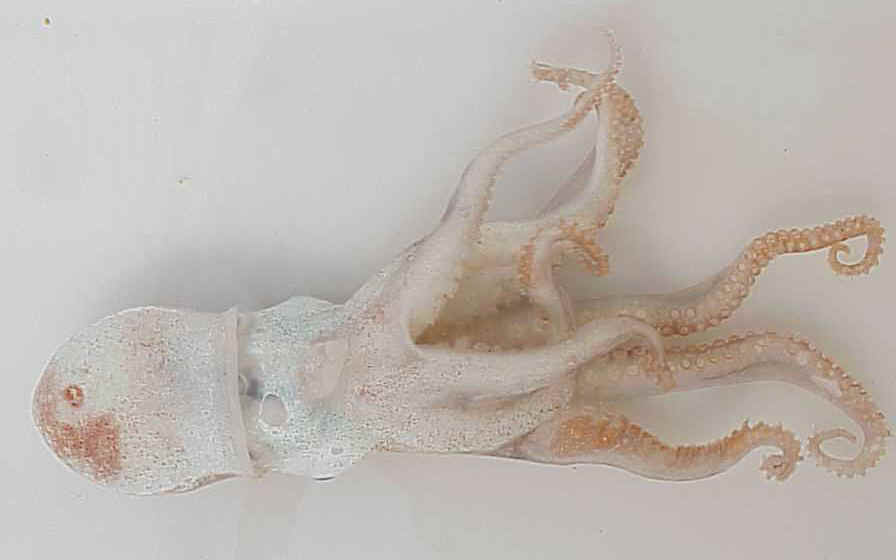|
Bathypolypus Valdiviae
''Bathypolypus valdiviae'', common name the boxer octopus or Valdivia bathyal octopus, is a species of octopus in the Bathypolypodidae family. It is endemic to the south Atlantic off southern Africa below a depth of 500m where it was one of the most commonly sampled cephalopods, taken mainly from the sea bed. The specific name commemorates the SS Valdivia the steamship used on the Valdivia Expedition of 1898-1899 and which was led by Carl Chun Carl Chun (1 October 1852 – 11 April 1914) was a German marine biologist. Chun was born in Höchst, today a part of Frankfurt, and studied zoology at the University of Leipzig, where from 1878 to 1883 he was privat-docent of zoology and an a .... In a recent 2021 study, geographic distribution of the species has expanded to waters off Guinea–Bissau. References Luna A, Rocha F, PeralesRaya C (2021). A review of cephalopods (Phylum: Mollusca) of the Canary Current Large Marine Ecosystem (Central-East Atlantic, African coast). Jour ... [...More Info...] [...Related Items...] OR: [Wikipedia] [Google] [Baidu] |
Johannes Thiele (zoologist)
Karl Hermann Johannes Thiele (1 October 1860 – 5 August 1935) was a German zoologist specialized in malacology. Thiele was born in Goldap, East Prussia. His ''Handbuch der systematischen Weichtierkunde'' (English edition published by the Smithsonian under the title ''Handbook of Systematic Malacology'') is a standard work. From 1904 until his retirement in 1925 he was the curator of the malacological collection at the Museum für Naturkunde (Museum of Natural History) in Berlin. Thiele described more than 1.500 new species of molluscs; until today their types are deposited with the Museum of Natural History in Berlin. Especially important are his works on the Mollusca of the First German Antarctica Expedition and of the German Deep Sea Expedition aboard the vessel Valdivia. Thiele's classification of Gastropoda has been in use up to the past decade. It modified an earlier concept of Henri Milne-Edwards (1848) with three subclasses: Prosobranchia, Opisthobranchia and Pulmonata. ... [...More Info...] [...Related Items...] OR: [Wikipedia] [Google] [Baidu] |
Carl Chun
Carl Chun (1 October 1852 – 11 April 1914) was a German marine biologist. Chun was born in Höchst, today a part of Frankfurt, and studied zoology at the University of Leipzig, where from 1878 to 1883 he was privat-docent of zoology and an assistant to Rudolf Leuckart. After professorial posts in Königsberg (1883–1891) and Breslau (1891–1898), he returned to Leipzig as a professor of zoology.UNI Leipzig Professorenkatalog (biographical sketch) In 1888, Chun described seasonal vertical migration (SVM) which has a periodicity of ca. 1 year. Chun examined depth-stratified net samples from the |
World Register Of Marine Species
The World Register of Marine Species (WoRMS) is a taxonomic database that aims to provide an authoritative and comprehensive list of names of marine organisms. Content The content of the registry is edited and maintained by scientific specialists on each group of organism. These taxonomists control the quality of the information, which is gathered from the primary scientific literature as well as from some external regional and taxon-specific databases. WoRMS maintains valid names of all marine organisms, but also provides information on synonyms and invalid names. It is an ongoing task to maintain the registry, since new species are constantly being discovered and described by scientists; in addition, the nomenclature and taxonomy of existing species is often corrected or changed as new research is constantly being published. Subsets of WoRMS content are made available, and can have separate badging and their own home/launch pages, as "subregisters", such as the ''World List of ... [...More Info...] [...Related Items...] OR: [Wikipedia] [Google] [Baidu] |
Sea Life Base
The sea, connected as the world ocean or simply the ocean, is the body of salty water that covers approximately 71% of the Earth's surface. The word sea is also used to denote second-order sections of the sea, such as the Mediterranean Sea, as well as certain large, entirely landlocked, saltwater lakes, such as the Caspian Sea. The sea moderates Earth's climate and has important roles in the water, carbon, and nitrogen cycles. Humans harnessing and studying the sea have been recorded since ancient times, and evidenced well into prehistory, while its modern scientific study is called oceanography. The most abundant solid dissolved in seawater is sodium chloride. The water also contains salts of magnesium, calcium, potassium, and mercury, amongst many other elements, some in minute concentrations. Salinity varies widely, being lower near the surface and the mouths of large rivers and higher in the depths of the ocean; however, the relative proportions of dissolved salts vary ... [...More Info...] [...Related Items...] OR: [Wikipedia] [Google] [Baidu] |


